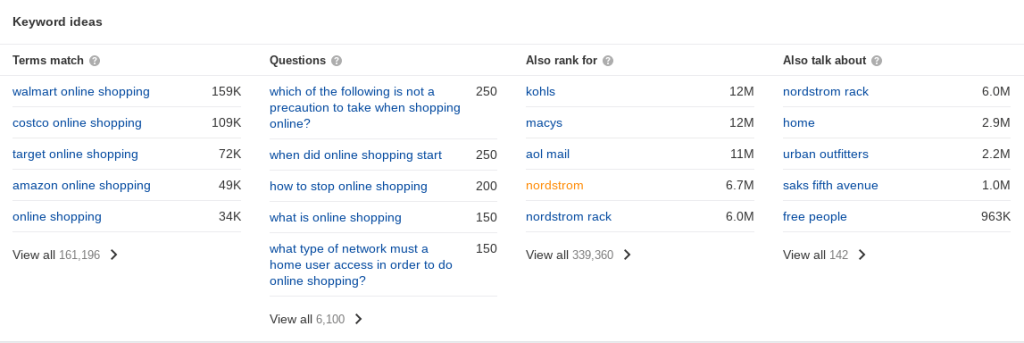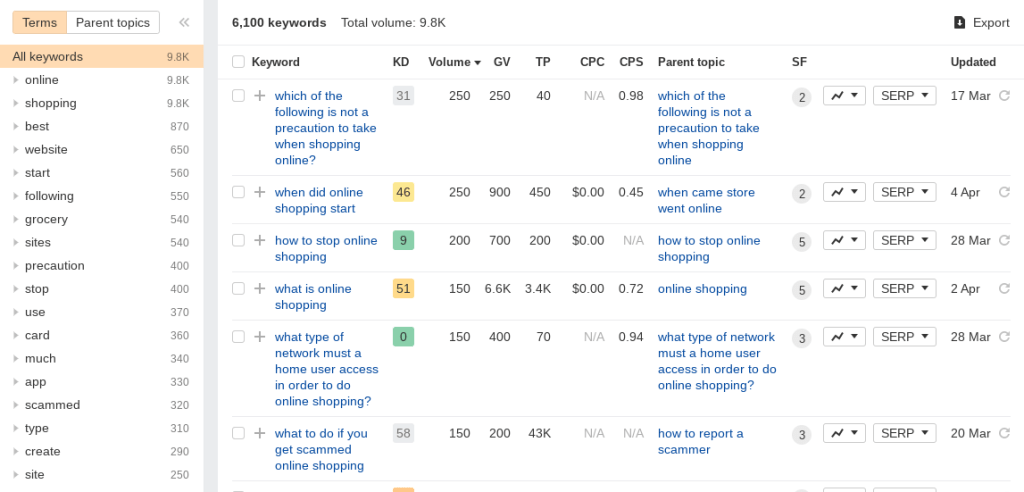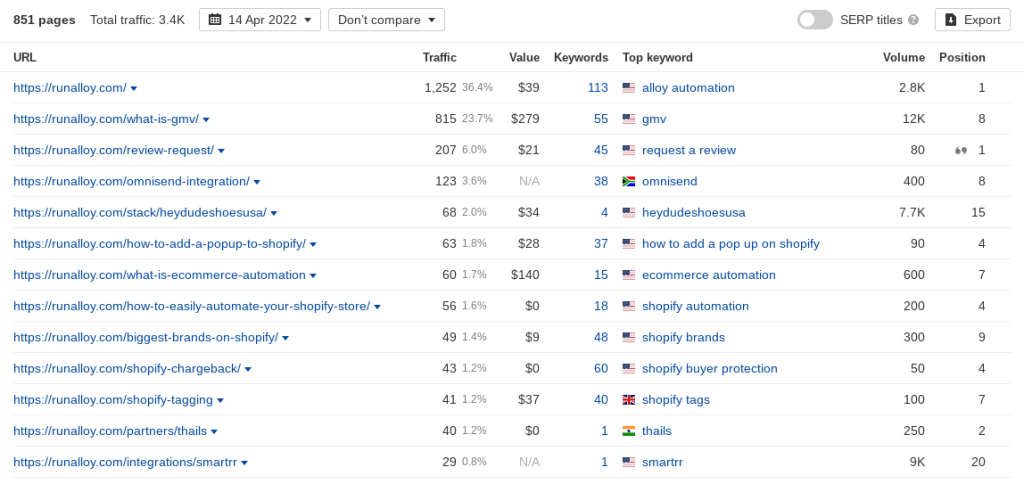If you run an eCommerce business, you know it is not all about the selling products to customers online. While this is without question an integral part of the company, you also face numerous business challenges every day. And one of the biggest difficulties is, of course, gaining new customers. You need to make it easy for customers to discover your online store.
There are several methods eCommerce companies can use to attract people to their websites. Popular methods include social media marketing, pay-per-click (PPC) ads, and search engine optimisation (SEO). These methods all have their pros and cons. For example, social media marketing and PPC will give you results right away because people will go to your website as soon as they see an ad for it online.
However, these options are costly and do not give you long-term benefits or results. New website visitors will only keep coming to your website as long as you keep paying for adverts. Conversely, search engine optimisation methods usually take a few months to start showing results. But, if you invest in SEO, your website’s positions in search results will improve and bring more organic traffic to the site. Furthermore, your website will keep these positions even if you choose to stop using SEO services in the future. This means you can continue getting free traffic indefinitely.
Watch this video to learn about some of the SEO strategies you can implement for your eCommerce business:
In regards to the long-term, investing in SEO services is a far superior option than paying vast sums of money for social media or PPC ads year after year. Plus, potential customers will trust you more if they find your website organically through search results rather than seeing an advert for your eCommerce goods and services.
But, the fundamental question is, can eCommerce companies genuinely attract new customers to their websites and businesses using SEO? The answer is a resounding yes. Below, we will show you just how successful your business can be if you employ an effective SEO strategy. Curious about how different platforms like Webflow impact SEO? Learn more about Webflow SEO and discover how it can work for your business.
How eCommerce SEO Works
eCommerce SEO is a strategy used to get more organic (i.e. free) traffic from search engines like Google, Yahoo and Bing to your online store. When you search for something online, you’re taken to the search engine results page (SERP). Below is an example of the Google search results for ‘men’s watches’. As you can see, there are a series of paid ads (red), followed by organic (green) search results:

eCommerce SEO aims to have your product pages appear within the first ten organic search results. Although there are more pages for people to explore, the further from the first page you are, the less traffic your site will generate.
SEO involves a series of strategic adjustments and developments to make your website both user-friendly and well-ranked on SERPs. Here are some of the main strategies that need to be covered for the best results possible:
- Technical Adjustments: This initial phase involves optimising the website’s infrastructure. Factors like site speed, mobile responsiveness and secure connections (HTTPS) play pivotal roles. Properly structured URLs, efficient site architecture and an XML sitemap can also massively help search engines crawl and index a site.
- Content Development: Content remains central to SEO strategy. For eCommerce, this means not only well-written product descriptions but also informative articles, blogs, and guides related to the products or services offered. Quality content addresses user queries, offers value and positions a site as a trusted resource.
- Outreach: Building authority is essential. This is achieved through outreach efforts, which involve forming relationships with other reputable websites. A website can collect valuable backlinks through guest posting, link building, and collaborations, further strengthening its authority with search engines.
Although SEO does not bring immediate results, the investment in time and effort is well worth it. A well-optimised eCommerce site gets more organic traffic and brand exposure, which ultimately leads to a higher probability of conversions.
Tips For Creating an eCommerce SEO Strategy
If you’re not familiar with SEO, we have laid out some of the basics to help get you started. We’ve left out as much jargon to make this the most simple and actionable guide possible.
Step 1: Keyword Research
The first thing you should focus on when creating your SEO strategy is keyword research. It’s vital you identify relevant and localised keywords that resonate with your target customer. Here are the ten stages of keyword research for you to consider:
| Stage No. | Action | Description |
| 1. | Define your niche | Understand your product range and the specific audience it caters to. |
| 2. | List primary keywords | Start with broad keywords related to your products (e.g. ‘women’s shoes’ or ‘laptop bags’). |
| 3. | Use keyword research tools | Utilise tools like Google Keyword Planner, SEMrush or Ahrefs to find keyword variations and volumes. |
| 4. | Check competitor keywords | Analyse your top competitors’ sites to identify keywords they’re targeting. |
| 5. | Prioritise long-tail keywords | Focus on longer, more specific phrases that customers might search for (e.g. ‘black leather boots’ or ‘mac laptop case’). |
| 6. | Consider search intent | Understand why users are searching. Are they looking to buy, research or compare products? |
| 7. | Factor in localised keywords | If you serve specific regions, include local terms (e.g. ‘women’s trainers in London’ or ‘laptop bag for the city’. |
| 8. | Analyse keyword difficulty | Use SEO tools like Moz and Ahrefs to gauge how hard it would be to rank for specific keywords. |
| 9. | Monitor seasonal trends | Some keywords may peak in searches during certain times of the year. |
| 10. | Refine and re-evaluate | Consumer trends change, so regularly revisit your keyword strategy to stay relevant. |
Step 2: Website Structure
A well-structured eCommerce website not only enhances user experience but also boosts SEO performance. Here’s a concise guide to optimising your site’s structure:
- Logical Hierarchy: Begin with a clear hierarchy. Typically, this should follow a format like Home > Category > Sub-category > Product. This structure is intuitive and helps search engines understand your site’s layout.
- URL Clarity: Ensure URLs are SEO-friendly and descriptive. For instance, use www.shopname.com/mens-shoes/running-shoes rather than a generic www.shopname.com/product12345.
- Breadcrumb Navigation: Implement breadcrumb trails. These are clickable paths that help users trace back to the homepage. They also reinforce the site structure for search engines.
- Internal Linking: Use internal links wisely. Link related products, or from blog posts to products, to distribute page authority and guide users.
- Optimise Crawl Depth: Aim to have all important pages reachable within 3-4 clicks from the homepage. This makes it easier for both users and search engine crawlers.
- Consistent Navigation: Maintain consistent navigation menus across all pages. This consistency aids in user navigation and ensures search engines can crawl all pages.
- Implement a Search Function: A search bar aids users in quickly finding products, improving user experience and potentially increasing conversions.
- Regularly Update the Sitemap: As you add new products or content, update your XML sitemap and submit it to search engines. This ensures they’re aware of all pages on your site.
Step 3: Technical SEO
Technical SEO is the foundation for all successful websites. Ensuring search engines can crawl, interpret and index a website effortlessly. This becomes even more critical for eCommerce platforms given the vast number of product listings, categories and user interactions. Here are the three core areas to address:
- Website Speed – A swift-loading site retains user attention and receives a nod of approval from search engines. Mobile responsiveness is another cornerstone; with increasing numbers of shoppers turning to mobile devices, a site that adapts seamlessly across devices is no longer a luxury but a necessity.
- Security – This is a significant concern, especially when transactions are involved. Hence, transitioning to HTTPS, which encrypts data and establishes a secure connection, is vital for eCommerce platforms. Furthermore, crafting a clear and logical URL structure aids both users and search engines in navigating the huge number of products and categories.
- Managing Duplicate Content – Due to similar product descriptions, duplicate content is a common challenge in eCommerce. Employing canonical tags can guide search engines to the primary version of a page, reducing potential confusion.
Step 4: Blog Content
For eCommerce, integrating a blog into your platform can be the key to unlocking enhanced visibility, engagement and conversions. Firstly, they allow sites to cover a broader range of keywords. While product pages target specific and often highly competitive keywords, blogs facilitate long-tail phrases, questions and topics that potential customers might be searching for. This expanded coverage can drive additional organic traffic to the site.

High-quality, informative blog content also positions an eCommerce platform as an authority in its niche. By offering value beyond just products, by sharing insights, how-tos and industry trends, sellers can build trust with their audience. This trust encourages repeat visits and can lead to higher conversion rates as consumers prefer purchasing from sources they deem knowledgeable and reliable.
Another SEO advantage of blogging is the potential for backlink acquisition. Exceptional content gets noticed, shared, and often linked to. These backlinks, especially from reputable sites, boost the eCommerce site’s authority, signalling to search engines that the platform is credible and worthy of higher rankings.
You can also use blogs to facilitate internal linking to guide visitors to related products or categories. This enhances user experience by providing relevant suggestions and helps distribute page authority throughout the site.
Step 5: Link Building
Ecommerce link building, the process of acquiring hyperlinks from external websites to your own, plays an important part in SEO, especially for eCommerce sites. It impacts both the visibility and credibility of your brand. If you’re unsure how to implement these strategies or need comprehensive assistance, one of the best decisions you can make is to contact a full service media agency. These agencies specialise in creating and executing tailored strategies that drive measurable results for eCommerce businesses.
Search engines use links to discover new web pages and determine their ranking. With their multiple product listings and categories, being found and indexed efficiently for eCommerce sites is crucial. External links act as pathways, guiding search engines to these pages.
Beyond helping be found, links also serve as endorsements. When a reputable website links to a product page or a piece of content on your eCommerce site, it indicates to search engines that your site is trustworthy. This trust can also significantly influence purchasing decisions, with such endorsements being the difference between a simple visitor and a paying customer.
However, it’s essential to note that not all links are created equal. Quality beats quantity. A few links from authoritative, relevant sites can have a more powerful impact than many links from lesser-known, unrelated sites. For successful eCommerce SEO, you should focus on strategic, targeted link-building with quality partnerships and genuine endorsements.
Search Demand for eCommerce on Google

The above screenshot shows Google search data on the term ‘online shopping’. As we can see, people globally search for this term 622 thousand times a month on average! These searches occur in substantial figures across many countries around the world. Roughly 383 thousand of these searches occur in India, 34 thousand in the United States, 21 thousand in South Africa, and a little further down the list, 16 thousand in both Australia and the United Kingdom. This demonstrates that there is a significant number of people looking for eCommerce services in your country daily. Therefore, effective SEO can help you attract tens of thousands of visitors to your website every month. If you choose to hire an SEO company to promote your eCommerce business website in search results, you will be in good stead to get a high return on investment (ROIs) for years to come in the future, especially as social media and PPC ads are becoming increasingly expensive and competitive.
People Use Lots of Search Terms to Find eCommerce
It is important to be aware that ‘online shopping’ and ‘online store’ are only a couple of possible keywords, and there are numerous other terms people might use when looking for eCommerce goods and services. One critical part of SEO is keyword research, during which experts examine search queries and work out which pages need to be created on the website and optimised for keyword usage to draw maximum traffic. Here is just a small number of examples of search queries people enter on Google when they require eCommerce services:
- ‘Online retail’
- ‘Secure online store’
- ‘Online shopping for…’ + requirement. For example, ‘online shopping for clothes’.
- ‘Online shopping for…’ + country. For instance, ‘online shopping for the UK’.
- Descriptions of delivery times, such as ‘online shopping fast delivery’.
- Descriptions of whether they wish to buy or sell. For example ‘where to sell my old CDs online’.
The screenshots below show the average monthly search volume for a range of eCommerce-related keywords. As you can see, there are millions of people searching for these keywords every month, meaning that a great SEO-optimised eCommerce website can draw thousands of free visitors each month purely by showing up for these keywords on Google.


Other eCommerce Companies Getting Results From SEO
Effective search engine optimisation can bring phenomenal results, helping websites show up higher in search results as well as potentially saving website owners thousands of dollars on advertising every month. However, it should be carefully planned and executed. Take SEO expert Duane Forrester’s quote, for example:
“SEO is a marketing function for sure, but it needs to be baked into a product, not slapped on like icing after the cake is baked.” – Duane Forrester, Senior Program Manager at Microsoft
Below, we take a look at several examples of eCommerce websites that are enjoying an excellent return from their SEO efforts.

Our first example is www.ebuyer.com. Founded in 1999 in Sheffield, UK, Ebuyer is an electronic commerce retailer of electrical and computer goods. The website has 795 thousand average monthly visitors. These are people who visit the site after seeing it pop up in Google search results.
At the same time, the website’s average monthly traffic value is roughly $262,000. This amount shows how much money the owner of the website would need to spend every month to purchase an identical amount of traffic they get organically from contextual advertising systems such as PPC ads. Consequently, this means that the website’s owner can save over $260,000 every month because their website has fantastic positions in Google’s search results.
The image below presents which pages bring the most traffic to this website.

As we can see, the pages in this list above collect impressive traffic from a range of pages. An excellent SEO expert can analyse the pages currently on your website (as well as on competitor websites), optimise existing pages to help attract even more people, and create brand new pages that will collect as much organic search traffic as possible. Naturally, this is just one aspect of SEO work, and there are many other things SEO agencies do to promote and optimise websites.
You might be thinking it is hardly surprising to see impressive results with an older and well-established eCommerce website, but what about a newer and smaller company that provides tools for other online retailers rather than selling products themselves? Is SEO still a viable investment? Our screenshot below will demonstrate to you that it most certainly is.

Clearly, even for a smaller and newer website, the results are encouraging. Alloy Automation is a California based eCommerce business founded only in 2019. It is an eCommerce automation tool used by many top brands to automate all sorts of marketing and operations workflows.
Let’s consider how their website is doing at the moment. Alloy Automation attracts roughly 3.5 thousand organic website visitors each month and has a traffic value of approximately $900. It ranks highly on Google for many keywords and is attracting admirable traffic. This website gets $900 worth of free traffic from Google, meaning they can save this money that would otherwise have been spent on PPC ads.
The primary factor to bear in mind is that PPC ads involve basically buying traffic in exchange for money. So it follows that once you stop paying for these ads, you also stop getting traffic. But, with SEO, you will maintain your search positions and continue to get traffic even if you no longer use SEO services. By hiring an expert SEO agency and boosting the rankings of your website on Google, you can save money and keep your website’s traffic without having to spend money on advertising channels such as PPC.
Let’s now consider the pages that bring the most visitors to this website:

Some of the keywords that bring the majority of traffic to these pages include ‘eCommerce automation’, ‘Shopify buyer protection’, and ‘how to add a pop up on Shopify. This again shows that there is a substantial variety of keywords that your website can use to collect free organic traffic on Google whether you sell products to customers directly or create tools for other sellers. A qualified SEO agency can effectively create, optimise, and promote those pages, bringing further business to your company.
Tracking and Analysing eCommerce SEO Metrics
Staying ahead of your competitors in eCommerce involves more than just implementing an SEO strategy; it requires continuous monitoring and adjustments. By keeping a close eye on metrics such as organic traffic, keyword rankings, and conversion rates, you can measure the effectiveness of your SEO efforts. These insights reveal what’s working and, crucially, what isn’t. For example, a drop in organic traffic might indicate algorithm changes, emerging competition or technical issues on the site.
Furthermore, the eCommerce sector can often be influenced by seasonal trends, new product launches and shifting customer behaviour. Regularly monitoring SEO metrics allows you to anticipate and respond to these changes. A product that becomes unexpectedly popular due to a viral trend can be further capitalised on with targeted SEO efforts.
Adjusting strategy based on metric analysis is essential for maintaining and improving search visibility. It ensures that resources are allocated efficiently, focusing on areas that offer the most significant returns. For instance, if certain keywords are driving substantial traffic but low conversions, the strategy might pivot to improve the user experience or target more conversion-friendly terms.
Here are some of the key metrics eCommerce businesses should track, along with the online SEO tools to help with analyses:
| SEO Metric | Description | Recommended Tool |
| Organic Traffic | Visitors arriving through unpaid search results. | Google Analytics |
| Click-Through Rate (CTR) | Percentage of users clicking your site’s link in search results. | Google Search Console |
| Conversion Rate | Percentage of visitors making a purchase. | Google Analytics |
| Keyword Rankings | Position of your site for specific keywords in search engines. | SEMrush, Ahrefs |
| Page Load Time | Duration taken for your site’s pages to load, influencing user experience. | GTmetrix, Google’s PageSpeed Insights |
| Backlink Profile | Number and quality of sites linking to yours, impacting authority and rankings. | Ahrefs, Moz’s Link Explorer |
| Mobile Usability | Assessment of how mobile-friendly your eCommerce site is. | Google’s Mobile-Friendly Test |
What Does an SEO Company Do?
While SEO is definitely a fantastic investment for eCommerce companies, achieving excellent results takes a lot of expertise, skill, and hard work. This is no exception for websites that provide services. Google maintains high standards to ensure that low-quality websites do not reach the highest positions in search results.
But, NUOPTIMA has been working with brands in various industries for many years, including the eCommerce industry. Our experts have a surplus of experience doing SEO for clients, including real estate, medical clinics, startups, SaaS, and, of course, eCommerce. Therefore, we know exactly what to do to get your website to appear on the first page of Google. Here are just a few things that we can do to improve your eCommerce company’s business rankings:
- Arrange link placements on reputable and relevant online retailer directories and databases.
- Create SEO-optimised content to help your website rank for more keywords on Google.
- Optimise existing pages to make sure they comply with Google’s best practices and rules.
- Create all the necessary pages to help your website in collecting as much organic traffic as possible.
Efficient search engine optimisation can bring brilliant results if done correctly and properly by qualified experts. At NUOPTIMA, we have a significant SEO team fit to bursting with expertise to help your website achieve great results. Book a free discovery call today with our professional team to explore how we can use SEO to get incredible results for both your website and your eCommerce business.
Propel Your eCommerce Business With SEO
In the bustling world of eCommerce, standing out from the crowd is crucial. With the right SEO strategies, your eCommerce business can rise above the competition, attracting more potential customers and driving growth. SEO is not just about increasing website traffic; it’s about attracting the right kind of traffic – potential customers who are actively looking for your products. Don’t let your eCommerce business blend into the background. Start your SEO journey with NUOPTIMA today and watch your business soar.
FAQ
SEO is important for eCommerce companies because it helps improve their online visibility. With the right SEO strategies, an eCommerce company’s website can rank higher in search engine results, attracting more potential customers. It’s a cost-effective way to increase website traffic and generate leads.
SEO is a long-term strategy, and it often takes a few months to start showing results. However, once your website starts ranking higher in search results, it can retain those positions even if you pause your optimization efforts.
Google considers several factors when ranking eCommerce websites, including the website’s relevance to the search query, the quality and quantity of content on the website, the website’s loading speed, mobile-friendliness, and the number and quality of links pointing to the website.
NUOPTIMA provides a range of SEO services for eCommerce companies, including keyword research, optimization of product descriptions and meta tags, creation of SEO-optimized content, technical SEO audits, and link building on high-quality sites.
You can get started with NUOPTIMA’s SEO services by booking a free discovery call with one of our specialists. We’ll discuss your needs and how we can use SEO strategies to improve your eCommerce website’s rankings.



